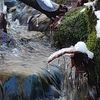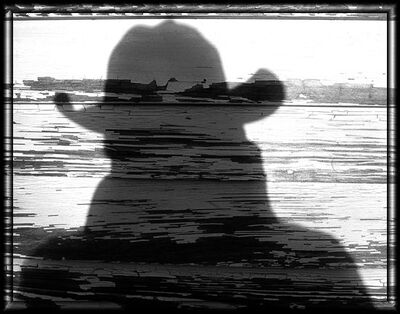Polarizing Filters
Jan 2, 2024 06:50:53 #
Jan 2, 2024 07:35:19 #
DirtFarmer wrote:
The polarizer only reduces the reflection. It does not reduce the unpolarized light preferentially, so turning it to 90 degrees from the weakest reflection will give you what you would see without any polarizer at all.
The amount of reduction can be controlled, which can enhance the effect of the lighting differences in the image.
I don't think he meant making the reflections brighter.
Jan 2, 2024 08:08:02 #
DRM
Loc: NC
jimpitt wrote:
I have a new Zfc with a 24-200 full frame zoom. I have been keeping the polarizing filter on, however I wonder if there are times when it is better to not utilizie the polarizer. Pardon if this is a basic question; I am a serious amateur and still learning about mirrorless. My main topics are dinner parties, sunsets, and landscapes. Thanks.
Invaluable for landscapes, including "intimate landscapes" which include no sky. Enhances colors by removing reflections from leaves, rocks, etc.--including those our eyes may not notice. Otherwise, not necessary.
Jan 2, 2024 08:16:20 #
DRM
Loc: NC
DRM wrote:
Invaluable for landscapes, including "intimate landscapes" which include no sky. Enhances colors by removing reflections from leaves, rocks, etc.--including those our eyes may not notice. Otherwise, not necessary.
Also, if you are a member of the "a protection filter is necessary" camp (I am not), a clear or possibly UV filter is a far better choice than a polarizer, because of the light loss involved with the latter.
Jan 2, 2024 09:27:23 #
The polarizer knocks 2 f-stops off an already slow lens. Wide open at f4, 24mm, you are already down to f8; at 200mm, you are around f13! Take the polarizer off, especially indoors. If you want to emphasize white clouds against a blue sky, or remove reflections on foliage outside, see if the polarizer is at the correct angle to make a difference. If not, don't use it. Generally, a polarizer is something you only occasionally put on, not leave on and occasionally take off.
Jan 2, 2024 09:30:07 #
ELNikkor wrote:
The polarizer knocks 2 f-stops off an already slow lens. Wide open at f4, 24mm, you are already down to f8; at 200mm, you are around f13!...
Effectively not physically.
Depth of field will not change.
Jan 2, 2024 09:36:12 #
CHG_CANON wrote:
Why have a polarizing filter at all? And at all times? I find mine virtually worthless, and rarely ever use, even though I do have clear or UV filters on my lenses at all times.
Other than some landscape situations, none of your other intended uses really suggest a benefit of a CPL.
Other than some landscape situations, none of your other intended uses really suggest a benefit of a CPL.
I suspect that you would see a marked improvement in the number of instances where a polarizer proved beneficial if you opted for a linear polarizer rather than a CPL.
Jan 2, 2024 09:40:17 #
TonyP wrote:
In my opinion you should leave the CPL off unless ... (show quote)
I just watched this video, and I agree he did a good job covering his use of a CPL filter. I may subscribe, or simply watch it again: thanks for sharing the link.
Jan 2, 2024 09:40:32 #
Timmers wrote:
Little is understood by many photographers about h... (show quote)
Wow, let’s talk down to everybody! How condescending and full of yourself can you be, even defining common words for us because you assume we won’t know them. As for removing reflections, polarizers remove them from non-metallic surfaces. More common knowledge. You should know that.
Jan 2, 2024 10:16:37 #
larryepage
Loc: North Texas area
With apologies to the original poster, this question has provided me with several days of both humor and despair. It is remarkable that simple questions of procedure ALWAYS turn almost immediately into extended tirades of personal philosophies and almost scriptural sermonizing.
OP--I suggest you give it a try and see what works. Check for vignetting and make sure your polarizer still does what it needs to do. If you are still able to do your indoor shots, who cares if you've had to give up a stop or two?
We're doing photography here. There's absolutely no reason for that to come with all the grief and stress that this forum brings. It's intended to be fun.
OP--I suggest you give it a try and see what works. Check for vignetting and make sure your polarizer still does what it needs to do. If you are still able to do your indoor shots, who cares if you've had to give up a stop or two?
We're doing photography here. There's absolutely no reason for that to come with all the grief and stress that this forum brings. It's intended to be fun.
Jan 2, 2024 10:30:28 #
jimpitt wrote:
I have a new Zfc with a 24-200 full frame zoom. I have been keeping the polarizing filter on, however I wonder if there are times when it is better to not utilizie the polarizer. Pardon if this is a basic question; I am a serious amateur and still learning about mirrorless. My main topics are dinner parties, sunsets, and landscapes. Thanks.
There are only a handful of good reasons to be using a Polarizer...these usually involve water or glass reflections or being used as a neutral density filter in landscapes/waterscapes.
The loss of 1.5 stops of light/ISO and the fact that it is another element in the optical path potentially can noticeably affect image quality. The loss of light can/will also negatively affect AF focusing. If using an optical VF, it will become dimmer.....
So, for most people, Polarizers should be carefully considered and used very sparingly !
.
Jan 2, 2024 10:30:32 #
BurghByrd
Loc: Pittsburgh
jimpitt wrote:
I have a new Zfc with a 24-200 full frame zoom. I have been keeping the polarizing filter on, however I wonder if there are times when it is better to not utilizie the polarizer. Pardon if this is a basic question; I am a serious amateur and still learning about mirrorless. My main topics are dinner parties, sunsets, and landscapes. Thanks.
Just my opinion -
They can be useful for eliminating reflections like photographing objects in a display case, in shop windows or from standing water.
They can enhance contrast in the sky or reduce haze and reflection in landscape photographs although they can cause banding in the sky esp. with wide angle lenses (read up on this).
Personally I'd use a clear filter for protection and have a CPL available for the above situations.
Jan 2, 2024 10:43:27 #
BurghByrd wrote:
Just my opinion -
I disagree. I don't believe it is just your opinion. Many here on UHH have the same opinion.

It's a good one!
---
Jan 2, 2024 10:52:08 #
petrochemist
Loc: UK
DirtFarmer wrote:
I use the polarizer only when I want to
(1) darken the sky (away from the sun)
(2) reduce reflections (at or near the Brewster angle)
Otherwise I leave filters off my lenses.
(I do use a clear filter occasionally when environmental conditions require it, e.g. salt spray, blowing sand, freezing mud, working around the manure spreader, etc).
(1) darken the sky (away from the sun)
(2) reduce reflections (at or near the Brewster angle)
Otherwise I leave filters off my lenses.
(I do use a clear filter occasionally when environmental conditions require it, e.g. salt spray, blowing sand, freezing mud, working around the manure spreader, etc).
Polarisers can also be used very effectively for boosting reflections (the filter just needs to be turned 90 degrees from the point that minimises reflections). I probably use them for this more often than I try to kill the reflection.
Either way a polariser should only be used when it's effect is wanted.
Jan 2, 2024 10:52:15 #
If you want to reply, then register here. Registration is free and your account is created instantly, so you can post right away.







